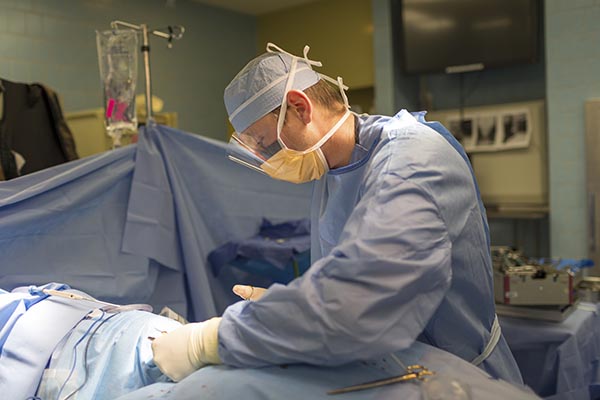Pain and Infection after Spine Surgery
It is tough to be the adult in the room. Most people only want to hear about the benefits of spine surgery. Spine surgeons chuckle about the reactions some patients have about their outcomes. If there is a good outcome, it is a miracle, a religious experience, or luck. If the outcomes are poor, it is the fault of the surgeon, hospital, society, etc.
As a scientist, and an outcomes predictor, I know there are factors that make poor outcomes more likely.
In a recent meeting, Dr. Owiocho Adogwa reviewed data on admissions to Duke University Hospital between 2008 and 2010 for elective spine surgery. The charts for 1400 patients were reviewed. Realize that during this time, most spine surgery patients were admitted to the hospital for procedures. 132 patients were readmitted to the hospital within 30 days. The vast majority of these re admitted had lumbar decompression and fusion. The most common reasons for readmissions were pain, and concerns for post-operative infection.
Frankly, this should not be a surprise, and this study just confirms what we already know. The paper also looked at larger cost consequences to the United States. Hospital readmissions for elective spine surgery costed $17 billion dollars. Of that amount, 58% of these costs were incurred by Medicare, and another 18% by Medicaid.
Today, Medicare no longer reimburses the hospitals for the costs associated with readmissions after elective surgery. The Hospital systems has financial incentives to reduce the readmissions rates. The Hospitals need to avoid readmissions to the hospital, because the cost of readmission will not be compensated by Medicare, Medicaid, and now most private insurance entities.
Hospitals have become more pro-active. There are some well know simple solutions to prevent infections, and great care is used to analyse any infection in the post op phase to identify any factors that may be modified. I will say the infection rates have decreased some what. But certain factors will always increase the rates of infection.
Patients with prior infections, uncontrolled diabetes, and obesity will always have increased infection rates. Secondary to the financial risks, Hospitals are now much less willing to assume the care for these patients. It is an opposite situation we had 10 years ago. Hospitals were actively seeking these patients, as any costs associated with complications, readmissions, etc was reimbursed by the payers, including Medicare and Medicaid. From a business perspective, there was every incentive to do as much as possible for these patients. It was also a perfect marketing opportunity, as the Hospitals will say things like ” we will take care of you, no matter the cost”. That was an easy thing to say, as they always got paid on a cost plus basis. For any of you who ran a business, it was a perfect business model. This is one of the factors why we had runaway cost increases for medical care in the USA.
Now, Hospitals are penalized for readmissions and infections. To survive, Hospitals need to prevent these complications. Around the periphery, they are doing good things to prevent infections. But most Hospital Systems have come to the conclusion it is better not to care for high risk patients, although they could never say that. I am sure many of you do not want to think that is happening. Then again, think about how many Hospitals no longer advertise the presence of a “Spine Center”. Most Hospitals have now promoted the outpatient procedures, and avoid the much more complicated, high cost major spine fusions and reconstructions.
For the Surgeons, there is no added compensation for caring for more complicated, higher risk patients. Most surgeons will still care for these folks, as that is part of our Professional Code of Conduct. On the other hand, government plans, and managed care plans now recognize the added risks, and costs, to these complicated reconstruction spine surgeries. The criterion to schedule elective high risk Reconstruction Spine Surgery has significantly tightened in the past 6 years.
In terms of pain control, larger more complicated surgery has more post-operative pain. Additionally, patients with prior pain medication tolerance have difficulty managing the increase pain after surgery. Emotional, and physical support of friends and family are very important for recovery. Prior to surgery, these factors must be assessed. If the patient does not have the proper understanding of the expected pain, surgery should be postponed, or even cancelled. Patients who do not have the proper home environment will also have extreme difficulty in the post-operative phase. If a proper home environment is not present, the surgical team should discuss arranging post-operative convalescence at a designated facility. Everything has a financial cost associated with utilization. If the patient cannot afford the proper post-operative care, again surgery should be post-poned or cancelled. Remember that this is elective surgery, in otherwords, not emergent. While the patient may be in pain, they will be in even more pain when they have a poor outcome from surgery. There are certain factors that will help improve the odds of surgery. If the patient can not optimize their chance of a successful outcome, most prudent Surgeons will postpone or cancel the surgery. That could financially hurt the Surgeon’s practice. On the other hand, bad outcomes will also financially hurt the practice, and a poor outcome is a difficult situation for the patient, the Surgeon and the payer.
Sorry to be the adult in the room. It is a lot easier to talk about the successful outcomes. On the other hand, the surgeon that is aware of the factors needed for a good result will be much more likely to delivery that successful outcome.
Last modified: January 5, 2018










